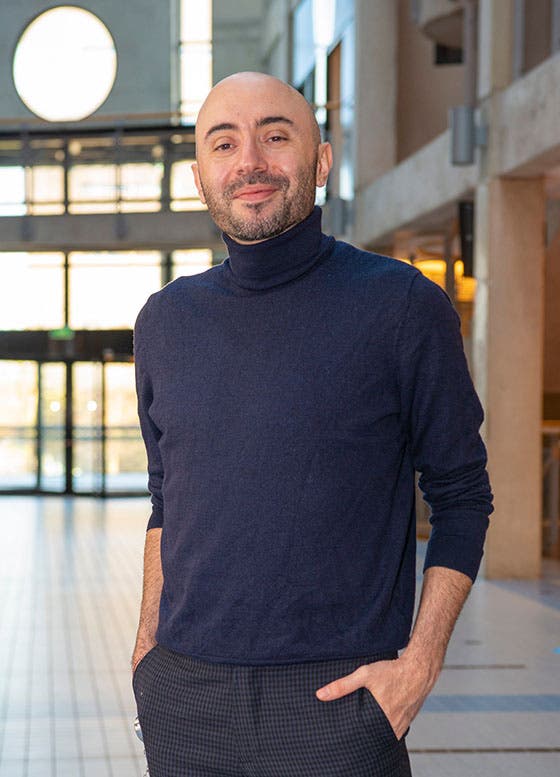Group Khalil - Invasion of epithelial tumors
Dr. Khalil is interested in how cancer cells become motile and invade into the surrounding healthy tissue. He investigates the movement of cancer cells in groups. This process is termed 'collective invasion'. His work focuses on how cell-cell communication and cell interactions with the extracellular matrix (ECM) control the organization and directional movement of cancer cell groups in epithelial tumors.

Career of Antoine Khalil uitklapper, klik om te openen
PhD studies
Dr. Khalil performed his PhD studies in the lab of Peter Friedl at the University of Wurzburg, Germany and Radboudumc, Nijmegen, The Netherlands. Here, Antoine identified that collective invasion is a predominant mode of local spread in breast cancer patients and characterized the role of connexin channels in organizing the invading cells into leader and follower cells.
Post-doc work
After finishing his PhD, dr. Khalil went to the lab of Johan de Rooij at the UMC Utrecht, where he pursued his investigations on cell invasion with focus on ECM mechanotransduction. Dr. Khalil investigated how cancer cells transduce biomechanical cues in the ECM and the underlying molecular mechanisms that promote invasive characteristics in particular subsets of cancer cells.
Assistant professor and research leader
As of January 2022, Dr. Khalil functions as an assistant professor and is leading the group invasion of epithelial tumors at the Center for Molecular Medicine.
Research topics uitklapper, klik om te openen
The aim of the group of Dr. Khalil is to decipher the cellular and molecular mechanism underlying invasion of epithelial tumors (incl. breast and liver), with focus on the reciprocal interactions between cancer cells and their biochemical and physical environment.
The main research aims are to :
- Identify the extracellular cues that promote invasion of cancer cells
- Characterize the signaling cascades through which cancer cells transduce the extracellular cues and become invasive
- Determine the impact of cancer invasion on the biochemical and physical properties of the surrounding tissue
We employ multidisciplinary research using patient-derived organoids, 3D ECM, in vivo mouse models, molecular interference strategies, transcriptomics and proteomics, quantitative microscopy and histopathological analysis of epithelial tumors.
Group members uitklapper, klik om te openen
Dr. Antoine Khalil - group leader
Kitty van Zwietten - research technician
Sabine Wentholt - Master's student
Babette Appelman - Master's student
Key publications uitklapper, klik om te openen
Multimodal techniques to study tumor growth, basement membrane breaching and invasion in 3D matrices. Daan Smits, Antoine A. Khalil*. Methods in Molecular Biology (In press). *Corresponding author.
Spatial collagen stiffening promotes collective breast cancer cell invasion by reinforcing extracellular matrix alignment. Thijs Koorman, Karin A Jansen*, Antoine A Khalil*, Peter Haughton*, Daan Visser, Max Rätze, Wisse Haakma, Gabrielè Sakalauskaitè, Paul J. van Diest, Johan de Rooij, Patrick WB. Derksen. (In press). *Equal contribution.
A YAP-centered mechanotransduction loop drives collective breast cancer cell invasion. Antoine A. Khalil, Daan Smits, Peter Haughton, Thijs Koorman, Karin A. Jansen, Mirjam van der Net, Lotte Enserink, Daan Visser, Milena Pasoli, Max Tak, Denise Westland, M. Guy Roukens, Zwartkruis Fried J, Patrick WB. Derksen, Johan de Rooij. (Under review)
Regulation of a progenitor gene program by SOX4 is essential for mammary tumor proliferation. M Guy Roukens, Cynthia L Frederiks, Danielle Seinstra, Luca Braccioli, Antoine A Khalil, Cornelieke Pals, Simon De Neck, Laura Bornes, Evelyne Beerling, Michal Mokry, Alain de Bruin, Bart Westendorp, Jacco van Rheenen, Paul J Coffer. Oncogene 40 (45), 6343-6353 (2021).
Collective invasion induced by an autocrine purinergic loop through connexin-43 hemichannels. Antoine A Khalil, Olga Ilina, Angela Vasaturo, Jan-Hendrik Venhuizen, Manon Vullings, Victor Venhuizen, Ab Bilos, Carl G Figdor, Paul N Span, Peter Friedl. Journal of Cell Biology 219 (10) (2020).
Cadherin mechanotransduction in leader-follower cell specification during collective migration. AA Khalil, J de Rooij. Experimental cell research 376 (1), 86-91 (2019).
Collective invasion in ductal and lobular breast cancer associates with distant metastasis. AA Khalil, O Ilina, PG Gritsenko, P Bult, PN Span, P Friedl. Clinical & experimental metastasis 34 (6-7), 421-429 (2017).
Gap junctions mediate STAT5-independent β-casein expression in CID-9 mammary epithelial cells. RS Talhouk, AA Khalil, R Bajjani, GJ Rahme, ME El-Sabban. Cell Communication and Adhesion 18 (5), 104-116 (2011).
Determinants of leader cells in collective cell migration. AA Khalil, P Friedl. Integrative Biology 2 (11-12), 568-574 (2010).
Heterocellular interaction enhances recruitment of [alpha] and [beta]-catenins and ZO-2 into functional gap-junction complexes and induces gap junction-dependant differentiation of mammary epithelial cells. RS Talhouk, R Mroue, M Mokalled, L Abi-Mosleh, R Nehme, A Ismail, A Khalil, Zaatari M, El-Sabban ME. Experimental cell research 314 (18), 3275-3291 (2008).
Also published comments on several articles as a F1000 Associate Faculty Member: https://facultyopinions.com/prime/thefaculty/member/1084981
Contact information uitklapper, klik om te openen
Email address: A.Khalil@umcutrecht.nl
